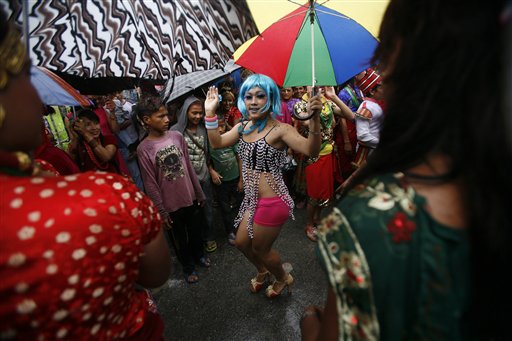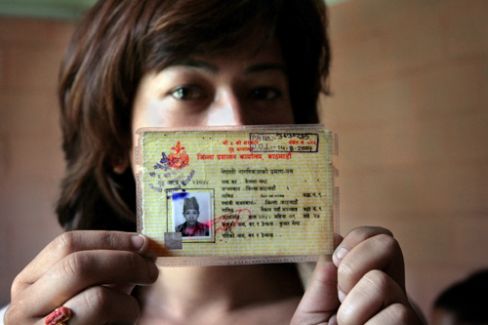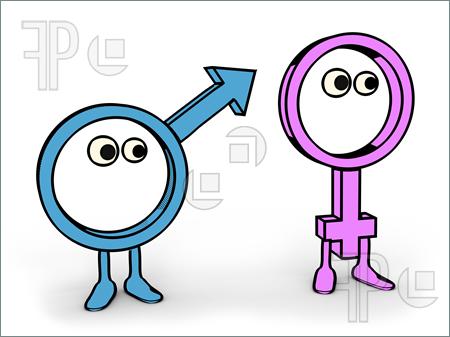Today is a special day in Nepal: hundreds of people have just marched through the city of Pokhara, demanding that the government recognise the rights of third-gender citizens on official certificates, allow same-sex marriage, and criminalise discrimination based on sexual and gender orientation.
Though the goal of the march was serious, it had a celebratory feel. Bollywood music played over loudspeakers and participants were outfitted in colourful clothes with beads and jewellery. There was no hostility towards the march’s approximately 2,500 participants. Instead, bystanders lined the streets, cheering them on. This isn’t surprising; though the march attests to the work that still needs to be done, Nepal’s LGBT rights movement has grown by leaps and bounds in the past few years. Today’s scene would’ve been hard to imagine a decade ago, before the end of Nepal’s 10-year Communist Revolution in 2006.

via montrealgazette
Nepal’s foremost LGBT rights organisation is the Blue Diamond Society which was founded by gay rights activist and politician Sunil Pant. A country boy, Pant moved to Nepal’s capital city of Kathmandu in his late twenties, hoping to find a sense of community. What he found instead was a stark contrast to the open, accepting atomosphere surrounding today’s march. Only a little over ten years ago, LGBT people in Nepal had to hide in an underground subculture, meeting at night in parks and feeling under constant threat from police violence. Yet Pant refused to hide in fear and shame. In 2001, he, along with a group primarily made up of transgender sex workers and third-gender identified individuals, started Nepal’s first gay rights organization – the Blue Diamond Society (BDS). The BDS became popular when, in 2004, the arrests of 13 of its members were covered by major NGOs and media outlets.
Following the end of the Communist Revolution, Pant was invited to participate in the Yogyakarta Talks. In Yogyakarta, Indonesia, a group of experts came together to discuss international human rights and how they are related to gender and sexual orientation. Pant was inspired by the talks and felt that with the end of the revolution, a new Nepal was possible, one in which LGBT peoples would be respected and have an important voice. At Pant’s urging, the Nepal courts adopted some of the conclusions from the Yogyakarta principles, the main one being that the sole criterion for identifying as a specific gender is self-determination. A third-gender category was established, and this 2007 Supreme Court decision has been called “arguably the single most comprehensive judgement of affirming protections of same-sex peoples anywhere in the world.” It led to the inclusion of the third-gender category on Nepal’s 2011 census.

via worldpolicy.org
Gender. Biology. Self-determination. These are some very, very important words. Words that affect a person’s worth and self-esteem. Words that can affirm a person’s humanity. That the Nepalese law recognises an individual’s right to self-determine gender is groundbreaking, but it doesn’t erase the social stigma many third-gender individuals feel. When census officials came to the home of a Nepalese farmer, the farmer’s wife marked the box titled male for her husband, not knowing that her spouse did not feel an affinity for either the male or female category, and would’ve much preferred to mark the third-gender box. Being properly accounted for was so important that, after returning home from the fields and discovering what had happened, the farmer chased after the census-takers only to be told that because the box was marked in pen, it wouldn’t be changed.
That a wife didn’t know the gender identity of her husband speaks to the shame and invisibility of many third-gender people. Another troubling incident occurred when census officials asked parents to remove their child’s clothing when they described the child as third-gender. This demonstrates not only an extremely troubling and invasive disrespect for privacy, but also a lack of understand ing about Nepal’s third-gender category. Because third-gender is a self-determined identity, it doesn’t need to have anything to do with biology or how a person looks naked.
In Nepal, third-gender people are those who don’t see themselves as having a fixed gender or sexual orientation. The category third-gender can also be used by people who feel they don’t fit into the male or female gender roles of their culture. This is different than in Australia, where there is also a third-gender category, simply marked on official papers, as “X,” but it can only be claimed by transgender people who are post-op and also by intersex individuals.

Something’s missing here.
Today’s march was a way of lifting the veil of invisibility that, despite the country’s growing LGBT movement, still hangs heavy. There are also pressing legal matters that many LGBT activists in Nepal feel still need to be remedied. Though the government recognises the third-gender identity, people who applied for certificates marked third-gender have to wait ridiculous amounts of time to receive their identification. In the meantime, they find it hard to get jobs, passports, enrol in college, or own property. It’s one thing for a court to give a ruling about accepting and recognising the rights of sexual and gender non-conforming people, as it did following the end of the Communist Revolution. But it is another thing entirely to see what’s decided upon in court translated into the realities of people’s every day lives.
Nepal’s marchers also want to ensure that queer rights will be included in Nepal’s new constitution, which will be written sometime after November . Twenty-six year-old Basu Guragi, who recently came out as gay and was a participant in today’s march, spoke of how too many in Nepal are still afraid of their families’ reactions to their sexual and/or gender identity. Today, Nepal’s queer community has fought to end fear, shame, and invisibility. They’ve done so colourfully, with awesome jewellery and music, and to cheers from bystanders.



A third gender on the Nepali national census.
One of many reasons why I laugh at people who still tout American exceptionalism.
I appreciate this A LOT. joy:)
Agreed. Much joy. It’s nice to see good things happening all over the world (we often hear too much of the bad).
I was impressed when I looked at the link to the Blue Diamond Society’s website too – they’re even going to get a nationwide TV program! At this rate, I wouldn’t be surprised to see WorldPride in Nepal someday…
Great article! Glad that you were so thorough – accomplishments as well as issues yet to be overcome.
I pronounced “Nepal” in my mind as “nee-pals” like nipples in maybe a weird pirate voice and then I thought, “wait that’s wrong…” lol! Obviously boobs are on my mind..
Thanks Malaika and Autostraddle for this update on my country’s LGBT movement . Some $$ will be coming your way (autostraddle)after I reach Finland and get my first stipend. And I must add you guys are awesome , each and every article published here is a treat for me as a reader.
Sorry I didn’t respond to you sooner. Thank you so much for this comment and for supporting Autostraddle! It means so much to me (and every other writer) that you read and like our articles :)
Great much needed article!
Despite it being one of the poorest countries in the world the Nepali people were (in general) some of the most generous and open-hearted I’ve met anywhere. I’ve heard people dismiss their advances in LGBT rights as being a way to curry favour with gay tourists, but I like to look at it from a different perspective – being flooded with so many people of other nationalities, they’ve had the opportunity to broaden their perspectives in a way that more insular countries don’t.
This is really making me want to go to Nepal and spend my tourist money there.
you should totally go ahead and do that.. it’s a great place!!
Blue wigs in marches always make me think, “Cosplayers’ rights NOW!”
More seriously, the Blue Diamond Society is inspirational. Thank you!